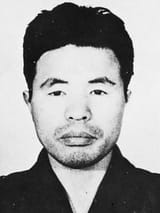>>719010709
>>719010539
>Yoshio Kodama (児玉 誉士夫, Kodama Yoshio; February 18, 1911 – January 17, 1984)[2] was a Japanese right-wing ultranationalist and a prominent figure in the rise of organized crime in Japan.[citation needed] The most famous kuromaku, or behind-the-scenes power broker, of the 20th century, he was active in Japan's political arena and criminal underworld from the 1930s to the 1970s, and became enormously wealthy through his involvement in smuggling operations.[3]
From 1939 to 1941 he traveled through China as a Japanese spy and built up a network that included various triads collaborating with the Japanese.[6] Like other Japanese secret service agents, he founded his own "Kodama Organization", which, thanks to his relationship with Admiral Ōnishi, had an exclusive contract as a purchasing agent in China for the aviation forces of the Imperial Japanese Navy.[citation needed]
With these resources, Kodama was able to use what he described as "self-sacrificing youth"[9] to engage in large-scale plunder in Manchuria and China and sell the stolen goods at a high profit in Japan.[citation needed] He is also said to have distributed opium and narcotics.[10] Kodama publicly regarded this activity as purely idealistic and patriotic.[11][page needed] By 1945, Kodama had become one of the richest men in Asia with assets equivalent to $175 million.
At the end of World War II, the defeat of Japan initially represented an enormous setback for Kodama. Shortly after the announcement of the unconditional surrender of Japan on August 15, 1945, he witnessed the ritual suicide of Admiral Ōnishi, but was subsequently unable to bring himself to commit seppuku. A little later he acted as an advisor to the Japanese interim government of Prince Naruhiko. Since Kodama feared the confiscation of his property by the US occupation authorities, he gave parts of it to the yakuza chief Karoku Tsuji.[14] Other possessions were kept on the grounds of the Imperial Palace in Tokyo

